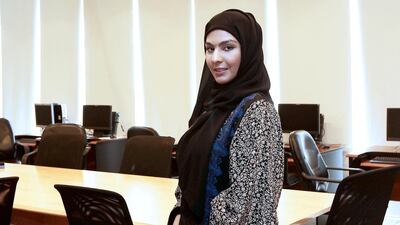“There’s not many Emirati ladies working in the field, and I want to set an example to others.”
These are the words of Fatma Alblooshi, a fraud specialist, who last year joined the graduate trainee programme at the telecoms company du.
Ms Alblooshi, 24, is part of du’s growing female workforce; currently three in 10 employees are female, 31 per cent of whom are Emirati.
“It’s providing motivation for women to enter the field and prove to themselves that anything is possible,” she says.
Since 2013, 47 graduates have joined du’s Masar sponsorship programme. The scheme plucks Emiratis who have recently graduated from university and wish to develop skills in the ICT sector.
During the 18-month course, each student is paid a monthly salary of Dh5,000, while taking part in classroom learning, on-the-job training and two weeks’ relevant work experience in locations such as New Zealand, Canada, Malaysia and Japan.
Fatma Alawi, a project manager in network delivery and operations, is another graduate of the scheme.
She joined the programme in 2010, keen to make her mark on the IT industry, which she feels offers several career paths for Emirati females. However, she is concerned over the lack of awareness.
"There are a lot of opportunities, but it's still seen as a male- dominant industry," she says. According to a 2014 survey from The Economist, there are currently more women in the UAE studying science, technology, engineering and mathematics (Stem) at government universities than men.
Furthermore, in Stem-related courses, the number of female graduates has reached 56.8 per cent at government universities. Yet, these figures are not represented in the workplace.
Adriana Rangel, research director for systems and infrastructure solutions at IDC Middle East, Turkey and Africa, says that 56 per cent of women in technology jobs in the private sector quit their roles when they reach midlevel.
“A recent study by our mother company IDG showed women make up less than 25 per cent of the IT departments in the majority of companies surveyed,” she says.
“In general, numbers tend not to be that favourable.”
However, Ms Alawi says she has never felt restricted in her career.
“We all receive the same training – this company [du] really doesn’t see a gender difference when it comes to hiring, training and progression.”
But it hasn't always been so simple for Arab women to seamlessly integrate into a large technology organisation.
Ms Alawi recalls how the guidance of the company’s executive vice president for brand and communications, Hala Badri, helped her find her feet during her early days at du.
“Every time I meet her I thank her,” she says. “Whenever someone said you can’t, she said she could. She always pushed us to do better.”
While du is taking great strides to increase the opportunities available to female workers, nationwide there is still work to be done.
The UAE ranks 115th in the Global Gender equality gap rating, one of the highest of the Gulf states, but still relatively low in a list of 142 ranked countries. It’s currently at its lowest rating since 2006, when it was viewed as 101st.
Despite this, the region’s women are pioneering the internet business sector, representing 35 per cent of all internet entrepreneurs in the Middle East, compared to just 10 per cent worldwide, according to IDC’s Ms Rangel.
“This is as a result of a local phenomenon: while a lot of women are encouraged to stay at home taking care of their families, they have been taking advantage of the internet to create online businesses which allow them to work from the comfort of their homes,” she says.
The passion shown by the region’s female entrepreneurs is also being replicated within the du training scheme.
“I’m here because I want to add [value] to my country,” explains Alya Al Saadi, another graduate trainee from the 2014 intake, working in security operations and risk management.
Ms Al Saadi joined du as an intern during her final year of university in 2014.
“I want to be a leader as we move towards building smart cities. I want to have an impact,” she confidently states.
business@thenational.ae
Follow The National's Business section on Twitter

